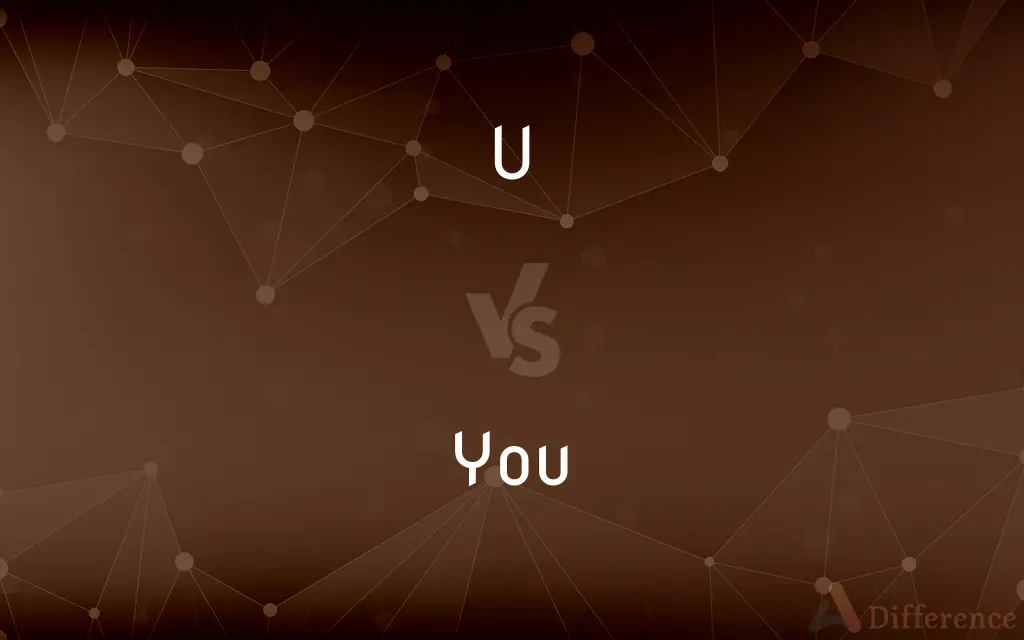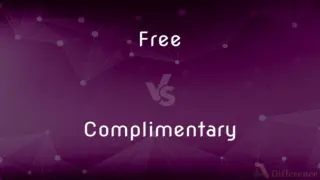U vs. You — What's the Difference?
By Tayyaba Rehman & Urooj Arif — Updated on March 26, 2024
U is a casual abbreviation often used in texting, while "you" is the formal English pronoun.

Difference Between U and You
Table of Contents
ADVERTISEMENT
Key Differences
U is a shorthand form of "you," primarily used in informal digital communication, such as texting or online chatting, to save time or space. It reflects a casual tone and is often employed in quick, informal exchanges. On the other hand, "you" is the proper English pronoun used in both singular and plural forms to address or refer to someone directly. It is appropriate for use in all contexts, from casual conversations to formal writing.
While "U" serves as a convenient and quick way to type, especially on mobile devices where brevity can be valued, "you" maintains the clarity and formality necessary for clear communication in professional and academic contexts. The choice between "U" and "you" can significantly affect the tone and perceived formality of a message.
In the realm of digital communication, the use of "U" can signify an attempt to convey messages rapidly or to mimic speech patterns more closely. However, this can sometimes lead to misunderstandings or be viewed as unprofessional in certain contexts, whereas "you" is universally understood and accepted across various forms of communication.
Moreover, the use of "U" is predominantly a feature of informal, digital text-based communication and is rarely found in formal writing, books, or professional emails. "You," however, is standard in both spoken and written English, serving as a fundamental component of the language's grammar and structure.
In educational settings or formal documents, the use of "you" is strictly adhered to, emphasizing the importance of proper grammar and spelling. Conversely, "U" might be seen in personal notes or amongst younger individuals who are more accustomed to informal digital communication.
ADVERTISEMENT
Comparison Chart
Usage Context
Informal, digital messaging
All contexts
Formality
Casual
Formal and informal
Communication Type
Texting, online chatting
Spoken and written English
Acceptability
Accepted in casual settings
Universally accepted
Implications
Can imply a lack of effort or be seen as unprofessional in certain contexts
Appropriate for formal and casual communication, ensures clarity
Compare with Definitions
U
Abbreviation for "you".
U need to see this video!
You
Appropriate for formal and informal contexts.
You are cordially invited to the ceremony.
U
Reflects casual tone.
Can U help me with this?
You
Second person pronoun in English.
You need to see this video!
U
Used in informal communication.
U won't believe what happened.
You
Used in both singular and plural forms.
Are you guys coming over?
U
Indicates a close relationship or informal setting.
U were amazing!
You
Universal in written and spoken English.
You made a great point.
U
Saves time/space in texting.
U coming tonight?
You
Fundamental in English grammar and communication.
You should try it sometime.
U
U, or u, is the twenty-first and sixth-to-last letter of the ISO basic Latin alphabet and the fifth vowel letter of the modern English alphabet. Its name in English is u (pronounced ), plural ues.
You
In Modern English, you is the second-person pronoun. It is grammatically plural, and was historically used only for the dative case, but in most modern dialects is used for all cases and numbers.
U
Chiefly British Of or appropriate to the upper class, especially in language usage.
You
Used to refer to the person or people that the speaker is addressing
Are you listening?
I love you
U
The 21st letter of the modern English alphabet.
You
Used to refer to any person in general
After a while, you get used to it
U
Any of the speech sounds represented by the letter u.
You
(object pronoun) The people spoken, or written to, as an object.
Both of you should get ready now.
U
The 21st in a series.
You
(To) yourselves, (to) yourself.
U
Something shaped like the letter U.
You
(object pronoun) The person spoken to or written to, as an object. (Replacing thee; originally as a mark of respect.)
U
U A grade that indicates an unsatisfactory status.
You
(subject pronoun) The people spoken to or written to, as a subject. (Replacing ye.)
You are all supposed to do as I tell you.
U
Used as a courtesy title before the name of a man in a Burmese-speaking area.
You
(subject pronoun) The person spoken to or written to, as a subject. (Originally as a mark of respect.)
U
A thing in the shape of the letter U
You
(indefinite personal pronoun) Anyone, one; an unspecified individual or group of individuals (as subject or object).
U
Abbr of underwater
You
The individual or group spoken or written to.
Have you gentlemen come to see the lady who fell backwards off a bus?
U
The twenty-first letter of the English alphabet, is a cursive form of the letter V, with which it was formerly used interchangeably, both letters being then used both as vowels and consonants. U and V are now, however, differentiated, U being used only as a vowel or semivowel, and V only as a consonant. The true primary vowel sound of U, in Anglo-Saxon, was the sound which it still retains in most of the languages of Europe, that of long oo, as in tool, and short oo, as in wood, answering to the French ou in tour. Etymologically U is most closely related to o, y (vowel), w, and v; as in two, duet, dyad, twice; top, tuft; sop, sup; auspice, aviary. See V, also O and Y.
You
Used before epithets, describing the person being addressed, for emphasis.
You idiot!
U
A nitrogen-containing base found in RNA (but not in DNA) and derived from pyrimidine; pairs with adenine
You
(transitive) To address (a person) using the pronoun you (in the past, especially to use you rather than thou, when you was considered more formal).
U
A heavy toxic silvery-white radioactive metallic element; occurs in many isotopes; used for nuclear fuels and nuclear weapons
You
The pronoun of the second person, in the nominative, dative, and objective case, indicating the person or persons addressed. See the Note under Ye.
Ye go to Canterbury; God you speed.
Good sir, I do in friendship counsel youTo leave this place.
In vain you tell your parting loverYou wish fair winds may waft him over.
U
The 21st letter of the Roman alphabet
U
(chiefly British) of or appropriate to the upper classes especially in language use
Common Curiosities
Is "you" appropriate in all types of communication?
Yes, "you" is appropriate and accepted in both formal and informal communications.
What is the main difference between "U" and "you"?
"U" is an informal abbreviation used in digital communication, while "you" is the proper English pronoun for formal and informal contexts.
Is "U" acceptable in formal writing?
No, "U" is considered informal and is not appropriate for formal writing.
How does the use of "U" affect the tone of a message?
The use of "U" can make a message seem more casual or informal.
Are there any exceptions where "U" could be used in formal communication?
Generally, there are no exceptions; "U" is predominantly reserved for casual, informal communication.
Why do people use "U" instead of "you"?
People use "U" for convenience and to save time in informal digital communications.
In what contexts is "U" most commonly found?
"U" is most commonly found in texting, online chatting, and other forms of informal digital communication.
Do age or cultural factors influence the preference for "U" or "you"?
Yes, younger individuals and certain cultural contexts might prefer "U" for its convenience in informal communication.
Can "you" be used to address a group?
Yes, "you" can refer to both an individual and a group.
Can the use of "U" be seen as unprofessional?
Yes, using "U" in professional contexts can be perceived as unprofessional or as a lack of effort.
How does digital communication influence the use of "U"?
Digital communication encourages brevity and informality, which has popularized the use of "U."
Is it important to know the audience when choosing between "U" and "you"?
Absolutely, understanding the audience's expectations is crucial in choosing the appropriate form to use.
Can "you" be used in text messages?
Yes, "you" can be used in text messages, especially when clarity or formality is desired.
Is "U" recognized in all English-speaking countries?
While "U" is widely recognized, its acceptance varies across different English-speaking cultures and contexts.
Does the use of "U" or "you" change in professional emails?
In professional emails, "you" is the appropriate choice to maintain formality and professionalism.
Share Your Discovery

Previous Comparison
Free vs. Complimentary
Next Comparison
Sash vs. GirdleAuthor Spotlight
Written by
Tayyaba RehmanTayyaba Rehman is a distinguished writer, currently serving as a primary contributor to askdifference.com. As a researcher in semantics and etymology, Tayyaba's passion for the complexity of languages and their distinctions has found a perfect home on the platform. Tayyaba delves into the intricacies of language, distinguishing between commonly confused words and phrases, thereby providing clarity for readers worldwide.
Co-written by
Urooj ArifUrooj is a skilled content writer at Ask Difference, known for her exceptional ability to simplify complex topics into engaging and informative content. With a passion for research and a flair for clear, concise writing, she consistently delivers articles that resonate with our diverse audience.
















































